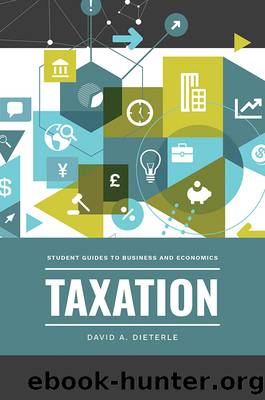Taxation by David A. Dieterle

Author:David A. Dieterle
Language: eng
Format: epub
Publisher: ABC-CLIO
Published: 2020-07-14T16:00:00+00:00
9
The Supreme Court and the Legality of Taxes
We have explored the roles for two of the federal-level branches of government. The third, the Supreme Court, also has a significant role in what and how U.S. citizens ultimately pay their taxes. As you know, all laws, including tax laws, originate in one of the two houses of Congress (House of Representatives or Senate). Once passed, the president must sign the bill to become law. Once law, if someone believes it is unfair, they can ask the federal court system to determine if the new law (or tax) is constitutionally legal.
New tax laws can be contested in federal court and often are. A case begins with the two sides presenting their sides of the tax law in a district court. The one side (the plaintiff) makes the case on why the tax is illegal. The government (the defense) makes its case on why the tax is legal and should remain. Once the court rules in favor of one of the sides, the losing side may appeal the decision to a higher level circuit appellate court.
If the losing side chooses to appeal the district court’s ruling, the two sides once again present their sides of the issue. Once a circuit appellate court decides, the losing side again has the option of appeal, this time taking the case to the Supreme Court. If the Supreme Court chooses to hear the case (it does not have to do so), both sides will then present their arguments before the seven judges of the Supreme Court. Whatever their decision, it is final. The only other court is the “court of public opinion,” which is another story for another journey.
There have been many tax laws throughout history whose existence was ultimately determined by the Supreme Court. A few of these were presented in our history of taxation in the introduction. Several parts of our current tax code and the taxing procedures are results of earlier decisions by the Supreme Court. A partial list of the most significant cases is provided at the end of the chapter. You will notice that many of the court cases occurred in the mid-twentieth century over the legality of the passed and states-approved new Sixteenth Amendment to the U.S. Constitution permitting a direct income tax.
Download
This site does not store any files on its server. We only index and link to content provided by other sites. Please contact the content providers to delete copyright contents if any and email us, we'll remove relevant links or contents immediately.
The Secret History by Donna Tartt(16623)
The Social Justice Warrior Handbook by Lisa De Pasquale(11489)
Thirteen Reasons Why by Jay Asher(7788)
This Is How You Lose Her by Junot Diaz(5772)
Weapons of Math Destruction by Cathy O'Neil(5037)
Zero to One by Peter Thiel(4824)
The Myth of the Strong Leader by Archie Brown(4789)
Promise Me, Dad by Joe Biden(4447)
Beartown by Fredrik Backman(4419)
Stone's Rules by Roger Stone(4415)
How Democracies Die by Steven Levitsky & Daniel Ziblatt(4399)
The Fire Next Time by James Baldwin(4343)
100 Deadly Skills by Clint Emerson(4078)
A Higher Loyalty: Truth, Lies, and Leadership by James Comey(4033)
Rise and Kill First by Ronen Bergman(4012)
The David Icke Guide to the Global Conspiracy (and how to end it) by David Icke(3882)
The Farm by Tom Rob Smith(3872)
Secrecy World by Jake Bernstein(3782)
The Doomsday Machine by Daniel Ellsberg(3731)
